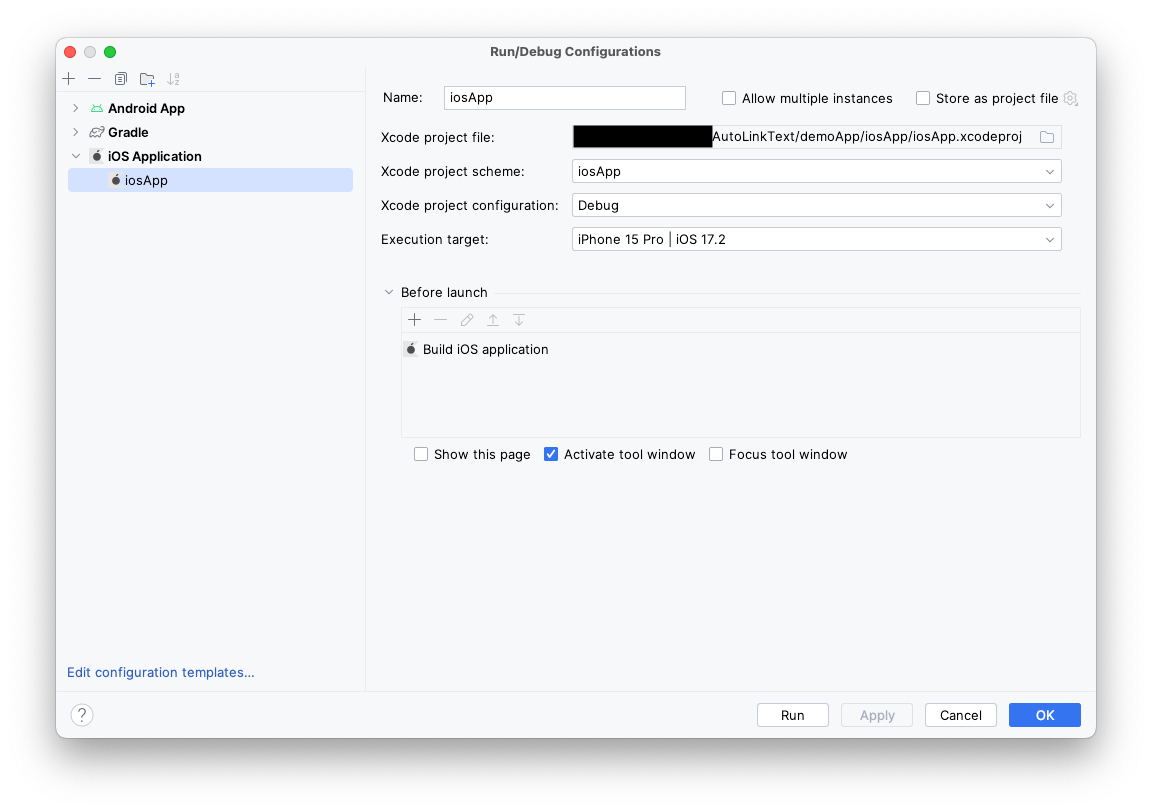AutoLinkText is a simple library that makes links, emails, and phone numbers clickable in text in Jetpack Compose and Kotlin Compose Multiplatform.
TextView has autoLink and Linkify but Compose doesn't have an equivalent. This library aims to fill that gap.
| Android | iOS |
|---|---|
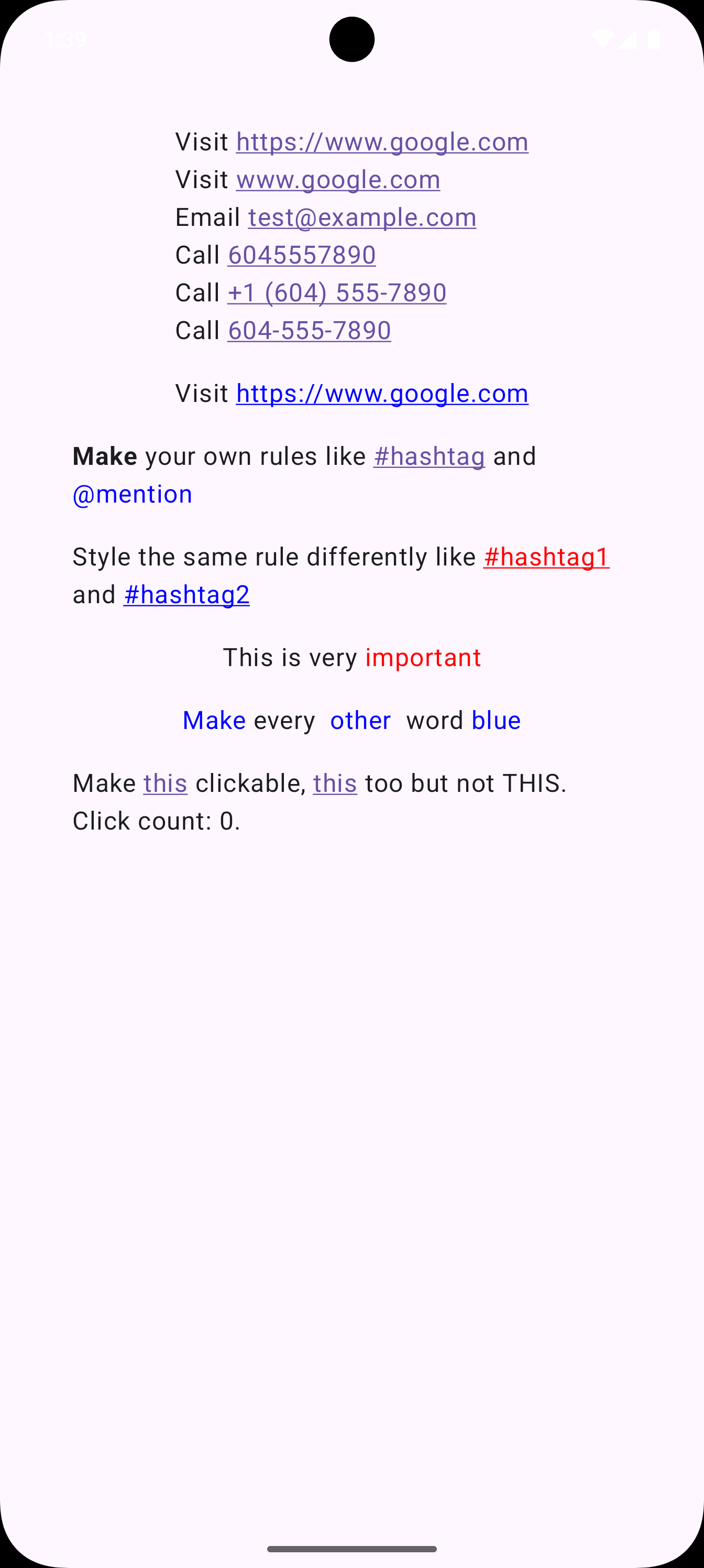 |
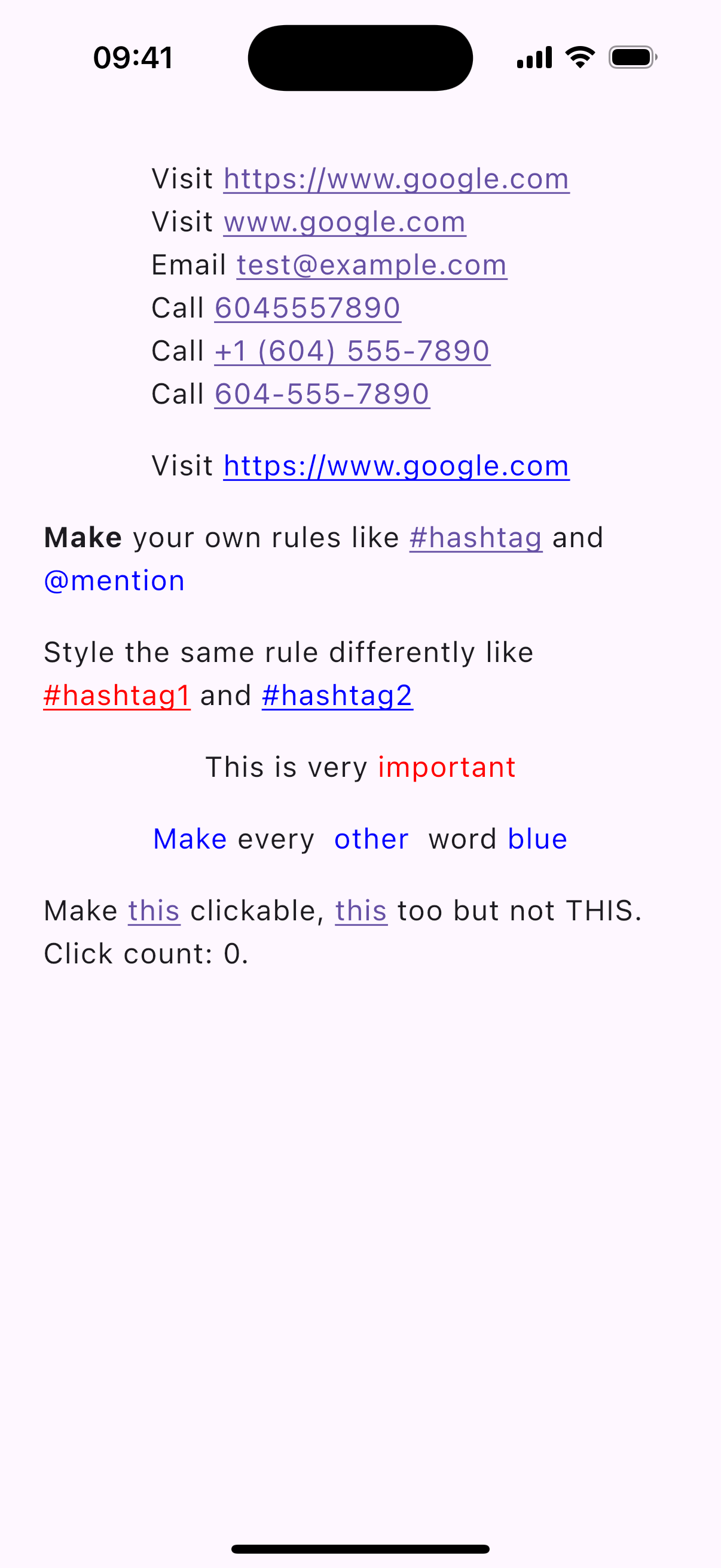 |
| Desktop | Web |
|---|---|
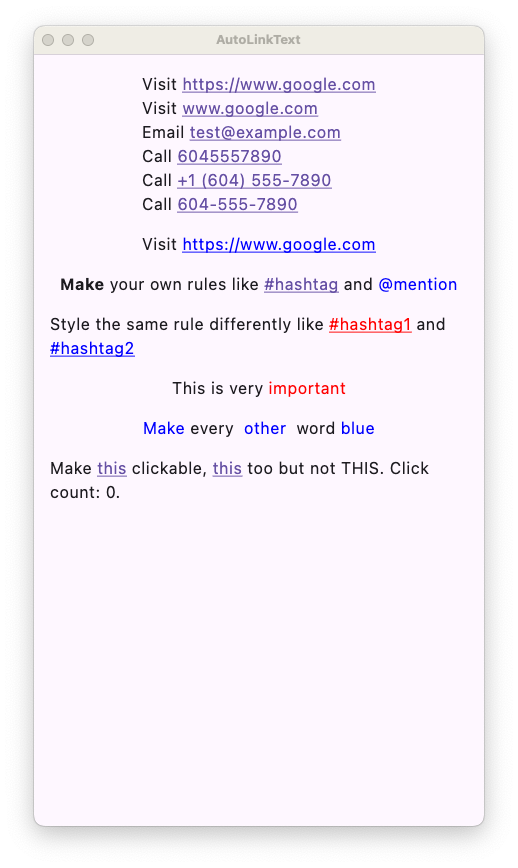 |
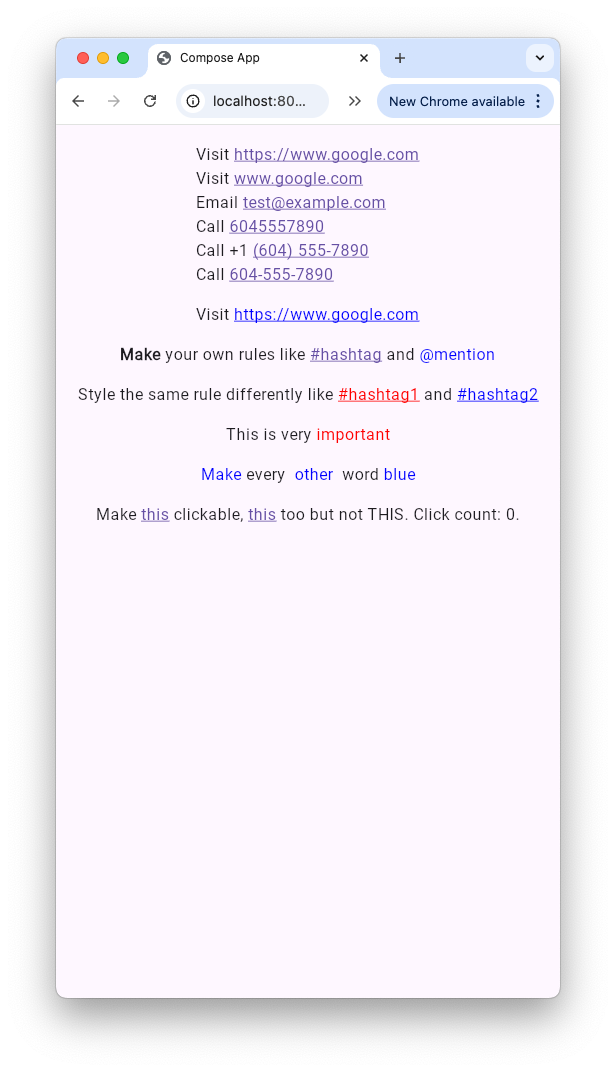 |
- Make links, emails, and phone numbers clickable in your text out of the box
- Create custom matchers for your own patterns (e.g. hashtags, mentions, etc.)
- Customizable styling for links
- Customizable click listeners for links
- Supports Compose Multiplatform (Android, iOS, Desktop/JVM, Wasm)
If you're using Version Catalog, add the following to your libs.versions.toml file:
[versions]
#...
autolinktext = "1.1.1"
[libraries]
#...
autolinktext = { module = "sh.calvin.autolinktext:autolinktext", version.ref = "autolinktext" }or
[libraries]
#...
autolinktext = { module = "sh.calvin.autolinktext:autolinktext", version = "1.1.1" }If you're using Gradle instead, add the following to your build.gradle file:
dependencies {
implementation("sh.calvin.autolinktext:autolinktext:1.1.1")
}dependencies {
implementation 'sh.calvin.autolinktext:autolinktext:1.1.1'
}See demo app code for more examples.
By default AutoLinkText turns URLs, emails, and phone numbers into clickable links and underlines them.
AutoLinkText(
text = """
|Visit https://www.google.com
|Visit www.google.com
|Email test@example.com
|Call 6045557890
|Call +1 (604) 555-7890
|Call 604-555-7890
""".trimMargin(),
style = LocalTextStyle.current.copy(
color = LocalContentColor.current,
),
)You can override the default styling by mapping over the default list of rules and changing the style in each default rule.
AutoLinkText(
text = "...",
style = LocalTextStyle.current.copy(
color = LocalContentColor.current,
),
textRules = TextRuleDefaults.defaultList().map {
it.copy(
style = SpanStyle(
color = MaterialTheme.colorScheme.primary,
textDecoration = TextDecoration.Underline
)
)
}
)Create your own rules by providing TextRules with a TextMatcher, an optional MatchStyle for the matched text and an optional onClick lambda.
AutoLinkText(
text = "Make your own rules like #hashtag and @mention",
style = LocalTextStyle.current.copy(
color = LocalContentColor.current,
),
textRules = listOf(
TextRule(
textMatcher = TextMatcher.RegexMatcher(Regex("#\\w+")),
style = SpanStyle(
color = MaterialTheme.colorScheme.primary,
textDecoration = TextDecoration.Underline
),
onClick = {
println("Hashtag ${it.matchedText} clicked")
},
annotationProvider = { "https://link.to.hashtag" },
),
TextRule(
textMatcher = TextMatcher.RegexMatcher(Regex("@\\w+")),
style = SpanStyle(
color = MaterialTheme.colorScheme.secondary,
textDecoration = TextDecoration.Underline
),
onClick = {
println("Mention ${it.matchedText} clicked")
},
annotationProvider = { "https://link.to.mentions" },
)
)
)Use styleProvider to provide a SpanStyle based on the matched text.
AutoLinkText(
text = "Style the same rule differently like #hashtag1 and #hashtag2",
style = LocalTextStyle.current.copy(
color = LocalContentColor.current,
),
textRules = listOf(
TextRule(
textMatcher = TextMatcher.RegexMatcher(Regex("#\\w+")),
styleProvider = {
val hashtag = it.matchedText
if (hashtag == "#hashtag1") {
SpanStyle(
color = Color.Red,
textDecoration = TextDecoration.Underline
)
} else {
SpanStyle(
color = Color.Blue,
textDecoration = TextDecoration.Underline
)
}
},
onClick = {
println("Hashtag ${it.matchedText} clicked")
},
annotationProvider = { "https://link.to.hashtag" },
),
)
)You can create TextRules that are not clickable by not providing an onClick lambda.
AutoLinkText(
text = "This is very important",
style = LocalTextStyle.current.copy(
color = LocalContentColor.current,
),
textRules = listOf(
TextRule(
textMatcher = TextMatcher.StringMatcher("important"),
style = SpanStyle(color = Color.Red),
annotationProvider = { null },
),
)
)Create your own matchers with TextMatcher.FunctionMatcher that takes the given text and returns a list of SimpleTextMatchResults.
AutoLinkText(
text = "Make every other word blue",
style = LocalTextStyle.current.copy(
color = LocalContentColor.current,
),
textRules = listOf(
TextRule(
textMatcher = TextMatcher.FunctionMatcher {
val matches = mutableListOf<SimpleTextMatchResult<Nothing?>>()
var currentWordStart = 0
"$it ".forEachIndexed { index, char ->
if (char.isWhitespace()) {
val match = SimpleTextMatchResult(
start = currentWordStart,
end = index,
)
if (it.slice(match).isNotBlank()) {
matches.add(match)
}
currentWordStart = index + 1
}
}
matches.filterIndexed { index, _ -> index % 2 == 0 }
},
style = SpanStyle(color = Color.Blue),
annotationProvider = { null },
),
)
)- Google seems to be working on replacing
ClickableTextAPI withLinkAnnotationbut it is not functional yet. I will try my best to keep this library up to date with the latest Compose APIs. - The default list of
TextRules are accessible. But at the moment accessibility is not great if you addTextRules with onClick function that does something other than opening a link because of a bug withClickableText. Hopefully this gets fixed in the future (See Google IssueTracker issue 274486643).
- AutoLinkText
- TextRule
- TextRuleDefaults
- TextMatcher
- TextMatcherDefaults
- MatchFilter
- MatchFilterDefaults
- MatchStyleProvider
- SimpleTextMatchResult
- TextMatchResult
- MatchClickHandlerDefaults
To run the Android demo app, open the project in Android Studio and run the app.
To run the iOS demo app, open the iosApp project in Xcode and run the app or add the following Configuration to the Android Studio project, you may need to install the Kotlin Multiplatform Mobile plugin first.
To run the web demo app, run ./gradlew :composeApp:wasmJsBrowserDevelopmentRun.
To run the desktop demo app, run ./gradlew :demoApp:ComposeApp:run.
Open this project with Android Studio Preview.
You'll want to install the Kotlin Multiplatform Mobile plugin in Android Studio before you open this project.
Copyright 2023 Calvin Liang
Licensed under the Apache License, Version 2.0 (the "License");
you may not use this file except in compliance with the License.
You may obtain a copy of the License at
http://www.apache.org/licenses/LICENSE-2.0
Unless required by applicable law or agreed to in writing, software
distributed under the License is distributed on an "AS IS" BASIS,
WITHOUT WARRANTIES OR CONDITIONS OF ANY KIND, either express or implied.
See the License for the specific language governing permissions and
limitations under the License.
